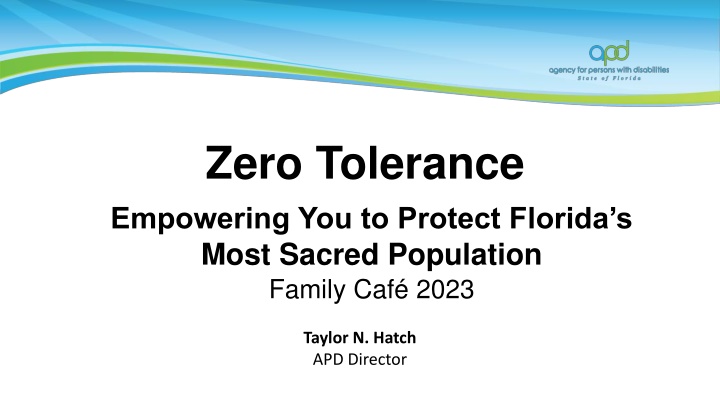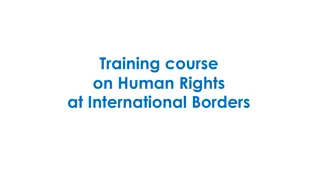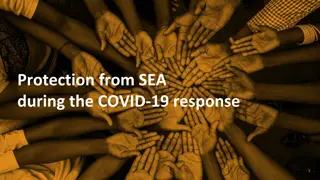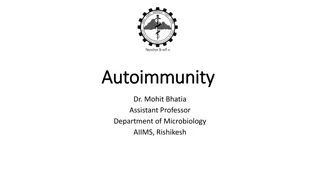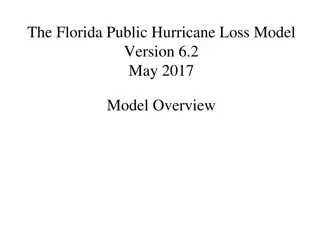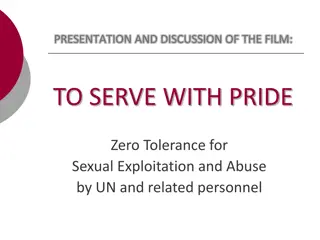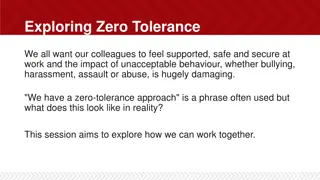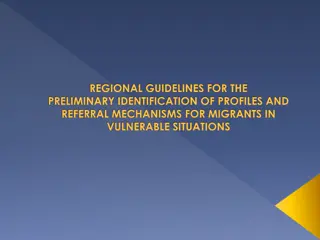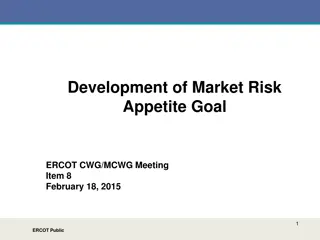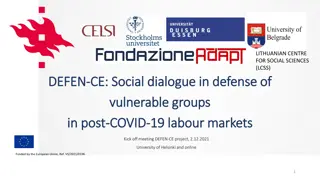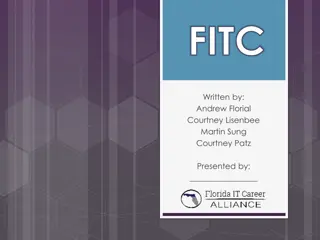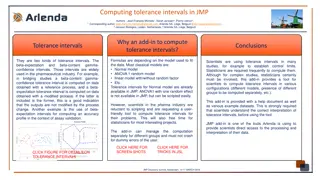Zero Tolerance Initiative: Protecting Florida's Vulnerable Populations
The Agency for Persons with Disabilities (APD) in Florida is dedicated to supporting individuals with developmental disabilities and combatting abuse, neglect, and exploitation. Through their Zero Tolerance Initiative and community efforts, they aim to empower individuals to report incidents and break the silence surrounding these issues. Legislative acts such as the Adult Protective Services Act and Proceedings Relating to Children emphasize the importance of safeguarding vulnerable populations. People with disabilities are unfortunately more susceptible to various forms of abuse and face challenges in accessing appropriate care and justice.
Download Presentation

Please find below an Image/Link to download the presentation.
The content on the website is provided AS IS for your information and personal use only. It may not be sold, licensed, or shared on other websites without obtaining consent from the author.If you encounter any issues during the download, it is possible that the publisher has removed the file from their server.
You are allowed to download the files provided on this website for personal or commercial use, subject to the condition that they are used lawfully. All files are the property of their respective owners.
The content on the website is provided AS IS for your information and personal use only. It may not be sold, licensed, or shared on other websites without obtaining consent from the author.
E N D
Presentation Transcript
Zero Tolerance Empowering You to Protect Florida s Most Sacred Population Family Caf 2023 Taylor N. Hatch APD Director
TOPICS TO DISCUSS TOPICS TO DISCUSS About our Agency Florida Statutes Abuse, Neglect, and Exploitation National Statistics Bullying Prevention Methods Reporting and Barriers
About Our Agency The Agency for Persons with Disabilities (APD) partners with stakeholders, sister agencies, nonprofits, faith-based organizations, parents, providers, private sector partners, and other networks to support people with developmental disabilities in living, learning, and working in their communities.
Zero Tolerance Initiative APD s Zero Tolerance Initiative was created as a community effort to combat abuse, neglect, and exploitation against persons with intellectual and developmental disabilities. While APD has made significant progress in our prevention efforts, much work remains to be done. We want to help empower you to break down the wall of silence and report, report, report.
415.101 Adult Protective Services Act It is the intent of the Legislature to provide for the detection and correction of abuse, neglect, and exploitation through social services and criminal investigations, and to establish a program of protective services for all vulnerable adults. 5
39.001 Proceedings Relating to Children To provide the care, safety, and protection of children in an environment that fosters healthy social, emotional, intellectual, and physical development; to ensure secure and safe custody; to promote the health and well-being of all children under the state s care; and to prevent the occurrence of child abuse, neglect, and abandonment. 6
People with disabilities are more likely to experience: Abuse, neglect, exploitation, and sexual misconduct, which is more severe and can last for longer periods of time Multiple and repeat perpetrators Abuse more frequently than others Difficulty escaping abusive situations Inadequate or inappropriate health care Finding justice or services Source: Intervention Tips. I-CAN! Accessibility Project Virginia Commonwealth University School of Social Work and Partnership for People with Disabilities. Retrieved from Slide Serve: https://www.slideserve.com/pmello/people-with-disabilities-affected-by-violence-court-advocacy-and-intervention-tips-powerpoint-ppt-presentation 7
ABUSE IS Any willful act or threatened act by a relative, caregiver, or household member which causes or is likely to cause significant impairment to an individual s physical, mental, or emotional health. Abuse includes acts and omissions.
Signs of Abuse Taunting, emotional stress Pushing, hitting Inappropriate or unwanted touching of sexual parts Mistreatingservice animals (Section 39.208,F.S.), Withholding food and medications Injuries in unlikely places Burns, bruises Sudden difficulty walking or sitting Poor or improper hygiene Dehydration Broken bones, sprains, fractures
NEGLECT IS The failure or omission on the part of the caregiver to provide the care, supervision, and services necessary to maintain the physical and mental health of the individual such as food, clothing, medicine, shelter, supervision, and medical services, which a prudent person would consider essential for their safety and well-being.
Signs of Neglect Leaving individuals unattended with no way to call for help Leaving individuals in bed all day Leaving individuals in soiled diapers Self-neglect (Call 850-300-HOPE for assistance)
EXPLOITATION IS. A person who stands in a position of trust and confidence with a vulnerable individual and knowingly, by deception or intimidation, obtains or uses, or endeavors to obtain or use, the person s funds, assets, or property with the intent to temporarily or permanently deprive an individual of the use, benefit, or possession of the funds, assets, or property for the benefit of someone other than the individual.
Signs of Financial Exploitation Sudden decrease or change in bank account balances Sudden problem paying bills or buying food or other necessities Sudden changes in wills or other financial documents
Human Trafficking Transportation, soliciting, recruiting, harboring, providing, enticing, maintaining, or obtaining another person for the purpose of exploitation of that person. Florida Statute Chapter 787.06(2)(d) 14
Types of Human Trafficking LABOR: Agriculture, Begging, Tourism, Nail Salon, Factory Labor SEX: Prostitution, Brothels, Clubs, Massage Parlors, Escort Services DOMESTIC SERVITUDE: Nanny, Live-in Maid, Cook, Landscaper, Butler 15
Risk Factors Some individuals with developmental disabilities are more likely to be victimized because of the perception of a social stigma, inability to assess danger until it is at crisis level, and lack of education. A few examples are: Dependence on others for long-term care Unable to differentiate between appropriate and inappropriate touching Lack of participation in abuse awareness and personal safety programs Unable to report the crime Not considered credible reporters May be socially isolated Lack of economic independence 16
Caregiver Risk Factors Caregiver stress and burnout can be a risk factor for abuse Caregiver may be experiencing their own personal trauma Source: Relias LLC, 2023 17
Potential Indicators Refusing to follow directions or complete necessary personal tasks for dependent person Using vehicle, money, or other resources without consent Using threats or menacing looks/body language as a form of intimidation Speaking for the person with developmental disabilities for attention
THERE IS NO UNIVERSAL RESPONSE TO ABUSE, NEGLECT, OR EXPLOITATION. EVERY INDIVIDUAL RESPONDS DIFFERENTLY AND, IN SOME CASES, THERE MAY BE NO OUTWARD SIGNS AT ALL.
Abuse Indicators The single most important thing to indicate the possibility of abuse, neglect, or exploitation of a person with a developmental disability is CHANGE. A sudden or gradual change in behavior, appearance, mood, and sleep patterns should always be noted and monitored.
Your response to a victim should always communicate I believe you. It s not your fault. You are not alone. I want to help you.
According to a National Statistics report, the rate of violent victimization against persons with disabilities was at least 3.5 times the rate against those without disabilities (per 1,000 people surveyed from ages 12 and older). Approximately 33% percent of the victims of violent crimes knew their perpetrators. Source: Bureau of Justice Statistics, National Crime Victimization Survey, 2009-2019. Published November 2021 by NCJ 301367
Children with disabilities, such as physical, developmental, intellectual, emotional, or sensory, are at an increased risk of being bullied. Source: www.stopbullying.org
Cyberbullying Occurs on social media platforms, such as Facebook, Instagram, Snapchat, and Twitter Text message Instant message Email Source: www.stopbullying.org
Prevention Methods Research shows that the single most effective way to prevent abuse, neglect, exploitation, and sexual misconduct is by providing education and self-protection training directly to individuals with disabilities. 25
Prevention of Abuse, Neglect, Exploitation, and Sexual Abuse of Individuals with Disabilities Enhance participation within the community to increase visibility in their communities Enhance Recognize and Address Recognize and address stigma and discrimination that exists Learn the signs of abuse, neglect, exploitation, and sexual misconduct Learn Report suspected abuse, neglect, exploitation, and sexual misconduct to the Florida Abuse Hotline Report Engage with support circles and community members to bring awareness Engage 26
How Do I Report Abuse, Neglect, and Exploitation? Telephone: 1-800-96-ABUSE (2873) Telephone Device for Deaf (TDD): 1-800-955-8771 Fax: 1-800-914-0004 For additional assistance not related to abuse: 1-850-300-HOPE (4673) Online: http://www.dcf.state. fl.us/programs/abus e/ Florida Relay: 711
For additional literature and educational trainings, please visit the APD Zero Tolerance website at apd.myflorida.com/zero-tolerance
THANK YOU FOR ATTENDING! Christy Smiley Email: Christy.smiley@apdcares.org Phone: 850-445-4317 Janette Canas Email: Janette.Canas@apdcares.org Phone: 850-922-4884 Kari Anderson Email: Kari.Anderson@apdcares.org Phone: 850-922-4204
